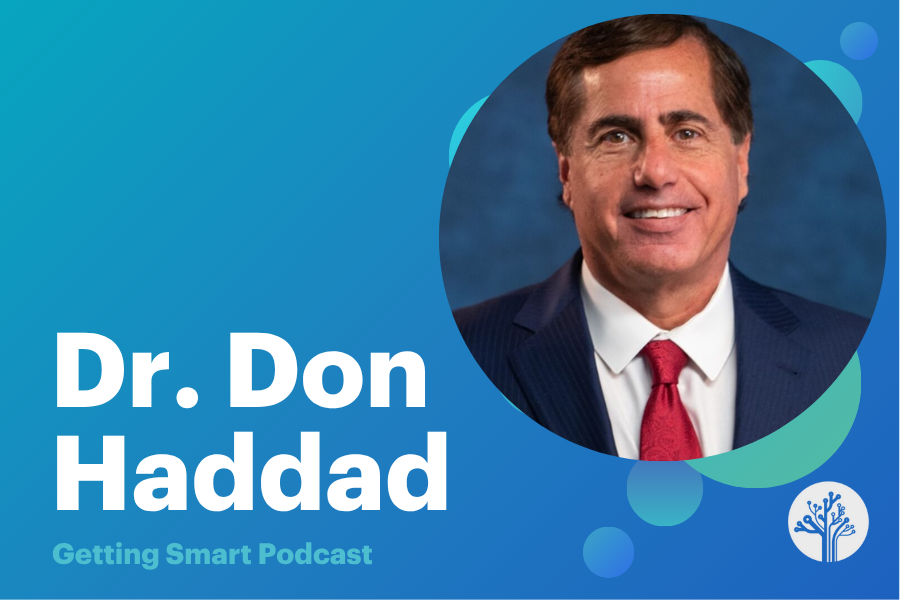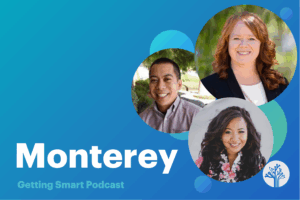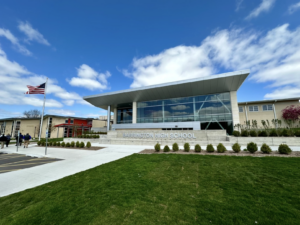Don Haddad on Creating a Responsive School System
Key Points
-
Dr. Haddad emphasized shifting the narrative by engaging the community with a contribution mindset, which rebuilt trust and inspired innovation within the district.
-
St. Vrain’s development of diverse and inclusive pathways has significantly increased graduation rates, demonstrating the power of aligning education with real-world opportunities.

In this episode of the Getting Smart Podcast, Tom Vander Ark sits down with Dr. Don Haddad, retiring superintendent of St. Vrain Valley Schools, to explore the impactful journey of transforming a school district into a responsive, high-performing system. Dr. Haddad shares insights on building a vision that aligns education with the fast-changing global environment, fostering community trust, and developing diverse pathways that significantly raised graduation rates. His approach to leadership and innovation, focused on equity and opportunity, has not only benefited the district but also set a benchmark in educational leadership. Tune in to discover how a mindset of contribution and community engagement can drive successful educational reform.
Outline
- (00:00) Introduction and Background
- (02:28) Challenges and Vision in 2008
- (09:14) Leadership and Mindset
- (21:50) Systemic Changes and Innovations
- (29:05) Extracurricular Achievements
- (33:53) Sustaining Growth and Overcoming Challenges
Introduction and Background
Tom Vander Ark: How to create a responsive school system. I’ve thought about that question every day for 30 years. Our guest today, Dr. Don Haddad, is the retiring superintendent of the St. Vrain Valley Schools in Longmont, Colorado. He has developed a pretty good answer to that question of how to build a responsive, high-performing, community-connected, well-regarded school system. In the process, he has taught me and the sector a lot about public school leadership. You’re listening to the Getting Smart Podcast. I’m Tom Vander Ark, and I have the distinct pleasure of talking to my friend and mentor, Dr. Don Haddad. Welcome, Don.
Don Haddad: Well, thanks a lot. It’s great to see you, Tom.
Tom Vander Ark: I just heard a few days ago that you announced your retirement from St. Vrain after 24 years of service. Is that right?
Don Haddad: That’s right, 24 years of service in St. Vrain and then 40 years of service in public education.
Tom Vander Ark: You’ve put up such a remarkable track record. What a journey. To be in a district for a quarter-century is really unusual these days. I think one of the reasons we’ve all had so much to learn from you is that you have stuck around, done the work, and been persistent. I think it takes a decade to do important system work, and you’ve put in a couple of decades. We really appreciate your leadership.
I made a list of 30 things that I appreciate about Don Haddad in St. Vrain Valley Schools, and I want you to talk about a couple of them. The first one is just the vision that you set for the district, but more broadly than that, for public education. If you go to the St. Vrain website, you’ll see “We Are the Future of America.” It’s a bold statement, and it’s what I think about when I think about you and St. Vrain. What is that vision for St. Vrain and, more broadly, the vision for public education? Don, how do you think about it?
Challenges and Vision in 2008
Don Haddad: I started the superintendency in 2008-2009. I was hired during an interesting time because several years before, the St. Vrain Valley School District had gone through bankruptcy due to some fiscal errors, and I inherited that. My predecessor wasn’t involved in that; his predecessor was. Nonetheless, in 2008, when we got there, St. Vrain was one of three school districts in the state of Colorado that had never passed a mill levy override. Through the financial errors, they went bankrupt, and the state treasurer had to come in and loan the district millions of dollars to keep the doors open. So we were starting from scratch.
Simultaneously, the world was changing at a fast pace. We were seeing things like Steve Jobs launching the iPhone, Twitter and Facebook launching, Hadoop and GitHub, Watson, fracking, and the Kindle. The world was changing at an unprecedented pace. The need for a vision and what was happening in the world came together. We wanted to create a school district in alignment with our global environment, and that meant bringing people together. So we initiated the 2020 visioning process with business leaders, elected officials, students, parents, teachers, and administrators. We asked, “Where do we want to be in 2020?” We played off the 2020 Vision, both the year and the clarity of vision.
We started to build out our STEM programming, design thinking models, and other initiatives that would move us away from traditional programs. We built a system we referred to as “foundation innovation.” The foundation is what everyone is familiar with: coursework, rigor, academics, which are critically important. But we knew that if we didn’t lay robust innovation on top of that foundation, half of the equation would be missing for our students to be prepared for a highly complex and competitive global environment.
We wanted to think about education differently because our community had lost faith in us. I think a mistake we make in public education is always going to the public and asking, “What can you do for us?” We went out to the community and said, “Here’s what we’re going to do for you.” We shifted that narrative, and it changed everything, leading to the birth of our vision.
Leadership and Mindset
Tom Vander Ark: Don, just a couple of things I want to underscore: a spirit of responsiveness and a commitment to community responsiveness that I think is unusual and important. The last thing you talked about was approaching the work with a contribution mindset of what you can do for the community, as opposed to launching a campaign from a deficit mindset.
Don Haddad: You know, I will tell you this: when people have said to me, “We do the polling, and it shows the public wants to know why you need the money,” I said, “Look, when you cold-call someone and ask if they would support public education to lower class sizes, they’re going to say yes. But at the end of the day, when the poll booth closes, they’re going to vote based on what’s in their personal self-interest.” That’s the nature of people. You can’t always rely on the polls that say a deficit approach works. People want to be associated with a winner.
Tom Vander Ark: Right.
Don Haddad: You have to understand that you cannot constantly be going back to the well asking for someone to fix you. You have to be going, at least with your handout to help. We’ve garnered over $2.2 billion in additional revenue beyond what the state and the federal government fund us from our community, and we’ve delivered on our promises.
Tom Vander Ark: Being a great fundraiser is number 11 on my list. You and Hilary Sontag are the best in the business. It’s your mindset, vision, commitment to contribution, and responsiveness that have made you really successful at raising revenue from a variety of sources.
Don Haddad: It’s a socioeconomics barrier if you don’t have resources. It’s compelling when you interview students who are contemplating dropping out. They give you a practical explanation. When you say to them, “What if I remove the financial barrier?” their mindset changes. It’s not unlike how adults respond. We don’t engage in meaningless activities if we don’t see a future or an end game to our efforts, and students are no different. Providing those opportunities provides hope.
Systemic Changes and Innovations
Tom Vander Ark: Let’s talk about the systemic changes and innovations you’ve implemented. For context, you serve a couple of big counties north of Denver: one of the most liberal and one of the most conservative. Could you describe your community leadership in that divided region and your philosophy of leadership development?
Don Haddad: Yes, it’s a great question. One of the things that makes St. Vrain unique is the diversity of our constituents. While they have differences of opinion politically and ideologically on certain things, one thing they all have is a deep love for their child. We find common ground there. If I speak my truth and explain it, even when some people disagree with my perspective on a particular topic, you become known as someone who’s going to speak clearly and truthfully. That develops respect and appreciation.
Tom Vander Ark: In terms of community leadership development, you’ve been proactive. You have a great school board, and that’s not by accident. It’s because the school district has made a long-term commitment to developing community leaders, some of whom choose to serve as school directors. Being proactive and expansive about developing community leaders has been part of your success.
Don Haddad: Absolutely. When you’re talking about people’s children, businesses, and public safety, people want to be involved. Leadership matters. It’s about having a clear and coherent vision and the ability to inspire people to achieve that vision. Listening, intelligence, hard work ethic are complements to leadership.
Tom Vander Ark: You have a terrific portfolio of schools and pathways. You’ve consistently innovated, ensuring every kid in every zip code in your district has access to high-quality learning experiences and pathways. Your pathway portfolio feels super intentional and very responsive to the business community. How do you think about these responsive pathways and ensuring all kids have access to high-quality pathways linked to opportunity?
Don Haddad: In 2008, one-off charter schools and online schools were emerging, and I thought there’s a need for systemic programs. We built systems that included focus school programs in aerospace, STEM, performing arts, medical and biosciences, international baccalaureate, leadership, energy, and more. We built out pathways in career and tech ed programs with welding, electronics, machining, optics, culinary arts, and more. Students who were dropping out lacked an understanding of what it all was leading to. We provided hope and opportunity. Our graduation rate is now over 96% on time from 75%, and our Hispanic graduation rate is over 91% on time.
Tom Vander Ark: I suspect that a high percentage of the 96% are leaving prepared for success in what’s next. Leaving with college credit, work experience, and valuable credentials. Not only the boost in graduation rate but the increase in students leaving prepared for success in the pathway of choice.
Don Haddad: We have thousands of kids earning their first year of college before they leave us. We have five PTECH pathways: Medical and Biosciences, Business, Computer Information Systems, Cybersecurity, and Teaching. Many graduates, about 75 a year, are graduating with their associate degree at no cost to the student.
Tom Vander Ark: Every one of them has had a valuable work experience. What we talk about innovating for equity means that those programs are not just for a bunch of kids that would’ve been in AP anyway. Your team is finding young people who haven’t come from a background with a lot of opportunity and showing them that accelerated supported pathways are for them. I love that spirit of innovation focused on equity.
Don Haddad: Socioeconomics is a powerful barrier if you don’t have resources. When students are contemplating dropping out, they explain that they want to start working. When you say, “If I remove the financial barrier, you’re looking at a $75,000-a-year salary,” their mindset changes. It’s providing those opportunities that offer hope.
Extracurricular Achievements
Tom Vander Ark: In the so much more category, St. Vrain is extraordinarily successful in extracurriculars. You have great competitive teams with more than 80% of kids participating. Participation rates usually slide, but you do both: a lot of kids participate, and you have levels of excellence recognized nationally. Your art and music programs are nationally recognized. I love the commitment to making art visible in St. Vrain. If you visit any of the schools, you’ll see art and hear students presenting and performing. That’s been a big part of the success.
Don Haddad: We’re very proud. In the last three years, we’ve had the highest percentage of state championships, both individual and team, of any school district in Colorado. Our music programs have been in the top 15% of all music communities in the country for five years in a row. We have 260 robotics teams in 60 schools, and we just won our third world championship in Texas, competing against 80 countries.
Tom Vander Ark: Let me underscore robotics. It’s part of your commitment to active learning and student engagement. Kids in St. Vrain want to go to school because they’re doing so much school stuff at school. Big shout out to Axel Rezi, who leads your Innovation Center. Robotics has created a beautiful sense of collaborative and competitive problem-solving. When I think about St. Vrain, I think about robotics.
Don Haddad: I used to say, “What if we packed the gyms on Saturdays with academics the way they packed the gyms for sports?” That’s what we do now. Saturdays, our gyms are packed with students K-12 and their parents competing in robotics, music programs, and athletics. I’m stunned when I talk to some school systems, and they haven’t even begun to think about a robotics program when robotics is a major part of our global economy.
Shorts Content
Sustaining Growth and Overcoming Challenges
Tom Vander Ark: Number 24 on my list of things I love about Don Haddad and appreciate about St. Vrain is policy advocacy. You’ve developed a point of view about how school systems ought to work and shared that with the legislature rather successfully. You’ve made a real contribution in state and national policy advocacy.
Don Haddad: We’re very active. We’ve passed close to 30 bills that originated out of St. Vrain. One I’m most proud of is a new accreditation system, which the governor just signed into law. It broadens our accreditation system beyond standardized tests to include career and tech ed programs and concurrent enrollment programs. It was a three-year process met with resistance but also with support when we articulated why the system needed to change. We brought the business community into the process because their bottom line depends on a viable workforce.
Tom Vander Ark: I can imagine that will be the case. I love how you’re learning and leading out loud and sharing freely in a learning community.
Don Haddad: Many people think about what we’re doing but stop short, thinking St. Vrain is lucky or has a lot of money. We share our beginnings: broke, no trust in the community, and bleeding enrollment. The argument that we don’t have money doesn’t hold water with us. There are many ways to develop revenue streams, systems, and plans to scale and sustain programs. It’s one of the hardest things to figure out, and those are the things we do with Lift Ed. We stay connected to a lot of folks even after they leave.
Tom Vander Ark: We appreciate that. You’ve had a terrific run. We’re talking to Don Haddad, the retiring superintendent in St. Vrain Valley Schools in Longmont, Colorado, about 30 miles north of Denver. A place you have to visit if you want to see a coherent, responsive system. I’d encourage all ED leaders listening to attend a Lift Ed session. It’s a terrific program.
You’ve had a great run, Don, and you’ve had a huge impact. I think about a dozen people in education who’ve done such good and important local work that it is of national importance. Your track record at St. Vrain puts you in that rarefied category of building a sense of community and graduating generations of kids who are globally competitive, conscientious citizens committed to contribution. You and your team have been a terrific example for the rest of us. For all of us, thank you. I’m looking forward to your next chapter of even more unfettered advocacy.
Don Haddad: Thank you. We appreciate you.
Tom Vander Ark: Thank you to our producer, Mason Pasha, and to the whole Getting Smart team for making this possible. Until next week, keep learning, keep leading, and keep innovating for equity like Don Haddad and St. Vrain. See you next week.
Guest Bio
Dr. Don Haddad
Dr. Haddad has been successfully involved in an educational career for 36 years. He assumed the position of Superintendent of Schools for the St Vrain Valley School District (SVVSD) in July 2009. St Vrain received the highest score on the i3 Grant for $3.6 million, and was one of 16 districts nationwide awarded the 2012 Race to the Top Grant for $16.8 million. St Vrain was also awarded several awards from various chambers of commerce and economic councils. Additionally, SVVSD was recognized as the National and International Organization of the Year in 2015 by the International Association of Public Participation, the Consortium of School Networks Leading Education Innovation Award in 2018, the ISTE in Education District of Distinction Award in 2019, and was one of 373 in North America to make the College Board’s 2019 AP District Honor Roll. In 2019, St Vrain was awarded the Colorado Succeeds Excellence Award for Technology Enabled Learning, and a Top 10 District by The Learning Counsel.
Dr. Haddad has served on the several Boards of Directors for various chambers and other business organizations. He has led the Longmont Chamber of Commerce Leadership Longmont program for ten years and has successfully spearheaded two mill levy overrides and two bond elections in 2008, 2012 and 2016.
Links









0 Comments
Leave a Comment
Your email address will not be published. All fields are required.